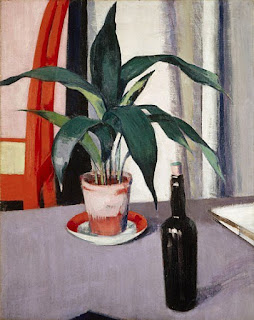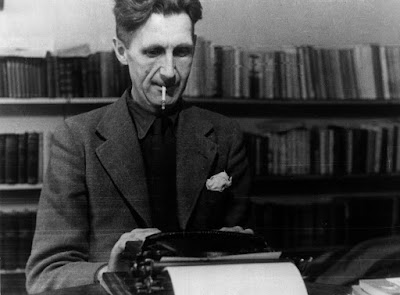I’ve only read three books by
George Orwell, and they’re not the three most people probably associate with
his name. He is, perhaps like Shakespeare, one of those writers whom we somehow
simply know and can even quote
without ever actually having read. I’m not entirely sure if that is a good
thing or a bad thing, but it certainly is a thing.
I may well have read a passage or
two from Animal Farm (1945) in
English classes at High School, but I’ve never read it all. Nor have I read Nineteen Eighty-Four (1949). But somehow
I can’t seem to recall my ever not
knowing about this satirical tale of animals as political allegory for
Stalinist dictatorship. All animals are
equal but some animals are more equal than others. Likewise the “newspeak”, “doublethink”,
“thoughtcrime”, and “Room 101” of Nineteen
Eighty-Four. Big brother is watching
you. But thinking about Orwell recently I was struck by the realisation
that I’d never really engaged with his works. What seemed strange to me is how
in many ways, and considering what little I know of him and his life, he would
most fundamentally seem to be my kind of
writer. As a Sixth Form and then undergraduate
student in my late teens and early twenties I avidly read the political
writings of Mahatma Gandhi, Albert Camus, Vaclav Havel, and later, Aung San Suu Kyi. I also read the
complete short fiction and personal writings of Franz Kafka. But not so much of
Orwell.
The first book of his I read was Down and Out in Paris and London (1933). For a time I contemplated writing my undergraduate
anthropology dissertation on some vague aspect or other of homelessness in
London society. When not in lectures I often idly drifted about London and occasionally
found myself engaging in conversations with various ‘down and outs’ I met on
the streets. But nothing came of it, perhaps because I realised to do such a
study properly would take more time and greater immersion than would be
possible in the timeframe required of an undergraduate dissertation project
(plus, asides from the question of what might be the most appropriate methodology; how to ethically
reconcile oneself with pursuing “participant observation” of such a topic, as
was required of the dissertation module? Should one pose as homeless in pursuit of veracity by being dishonest, or should one be open about being an academic observer, thereby maintaining honesty but creating a barrier through distance?).
In many ways I now regret not doing
that project, comparing Orwell’s observations of London’s homeless with my own
of some fifty-odd years later might have been a worthwhile endeavour. But my
head was probably too much in the clouds at the time, I doubt I’d have been
organised or disciplined enough to have done it justice. Instead I gravitated
onto his novel, Keep the Aspidistra
Flying (1936), which chimed more
with my own somewhat lazy artistic counter-culture inclinations – the story of
Gordon Comstock, a not-very-good poet nurturing a slowly simmering rancour
against the world and society in particular, which resulted in his busily being
determined to go nowhere with his life. A kind of über-Romantic anti-Romantic. But happily, that didn’t last quite
as long as it felt like it did at the time. Life eventually moved on.
And as life moved on, so too I
seemed to leave Orwell behind. It’s only recently that I came back to him. This
time drawn by an interest in his anti-imperialist writings which I thought
might chime with elements of my current PhD research. But there again, how was
it that I already seemed preternaturally aware of his essay, Shooting an Elephant (1936). Racking my
brains I have no recall of how, when, or where I first became aware of this
remarkable piece of writing. Somehow, I just knew about it already.
Hence I bought a copy of his Essays (2014). A gorgeously produced Penguin paperback with a design that harked
back to the iconic 1940s-look of that publishing brand. Rather suitably, I
thought. But inside the text has been reduced to fit this pocket-sized format,
which means that trying to read the thing is rather like trying to decipher the
semaphore of an ant attempting to communicate by dancing across a narrow blank
page with inky feet. However, that screwed-up-eyes intensity of reading repays
the effort well. I found Orwell just as engaging, if not moreso even, than I
did when I was half the age I am today.
I realise now the main thing I
like about his writing, asides from my sympathies with some of his viewpoints
and shared interests in certain topics, is how clear and frank he is – without
necessarily being simply clear and
frank. It’s hard to explain what I mean by this, and that’s perhaps why he’s
such a master prose-stylist. He does it so effortlessly. Although, I bet he did
and didn’t. I bet he laboured long over some parts whilst others must have just
poured out and seemingly wrote themselves. Maybe this is why he seems oddly
timeless. While he might be writing about times and realities which have long
since gone and which in many ways set his writings firmly in the context of
their times – he writes of pounds, shillings, and pence; his weights and
measures are imperial, he writes about drinking pints of mild, and buying so many
ounces of tobacco, to point to the simplest of examples – he also writes very
plainly about some topics which seem oddly open and thereby counter to my
preconceptions of the era; take sex for instance, he can be remarkably candid
about that – although, thankfully, not too
candid.
The social and moral observations
he makes and his analysis of such matters are what perhaps resonate most with the
modern reader, even now. It’s amazing he remains so fresh and seemingly
current, but then maybe he has simply hit on the most unchanging elements of our
reality. Perhaps the world, as he sees and understands it, was ever thus. Like Ben
Jonson’s famous summation of William Shakespeare, perhaps George Orwell is not
so much a man of his time, but rather more a
man for all time – or, to thieve a different aphorism (from Zhou Enlai), is
it still too early yet to tell?
A selection of BBC Radio 4 Programmes exploring the themes and political context of George Orwell's ideas and his writings






I had a very similar feeling about Shooting an Elephant - when did I first read this? Because when I read it recently it felt like I had always read it.
ReplyDeleteWriters like Orwell or Shakespeare simply seem to be part of our national and cultural collective consciousness without having to actively read them. With Orwell though he draws in so much modern history. I also seem to inadvertently keep coming across him, whether it be in a pub in Fitzroy or walking Jura, the remote Scottish island where he wrote 1984. In fact the writing of 1984 is almost as fascinating as the book itself, and inspired me to write a short story about a bunch of characters interacting on Jura that included Orwell and the KLF. The story should probably continue to keep gathering digital dust (ha!) but it was fascinating looking into the life of Orwell on Jura for it.
Sounds like an interesting story!
ReplyDeleteI definitely want to track down a good biography of Orwell now. The essays are a fascinating read, hence he's someone I feel I really should know more about.